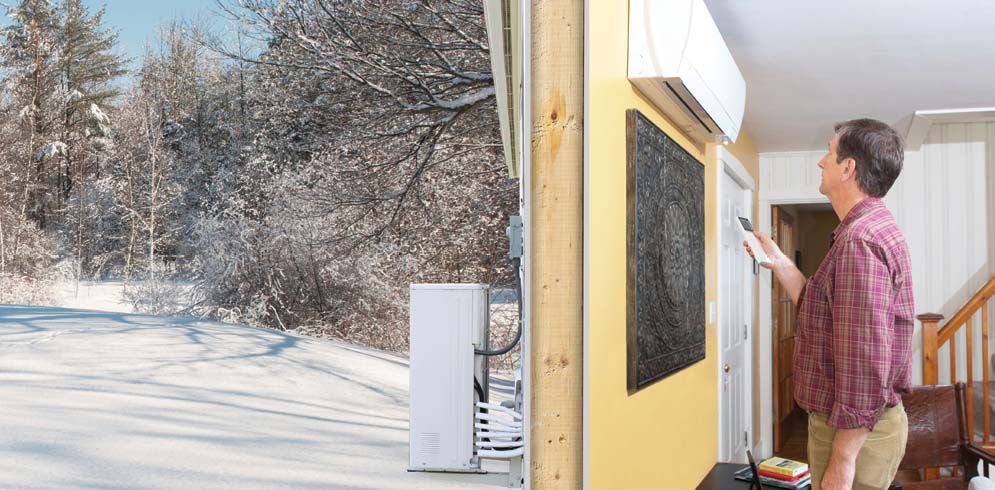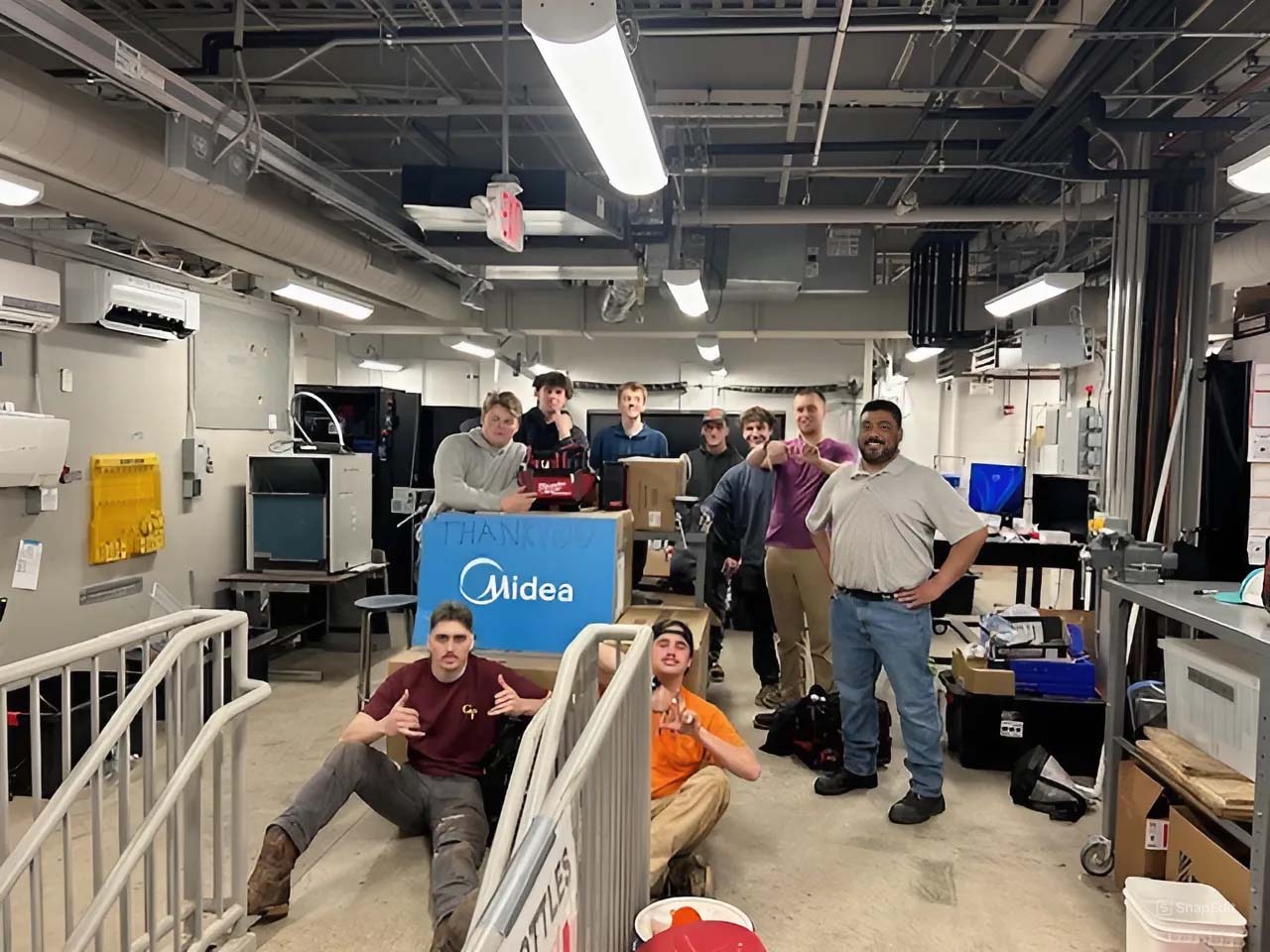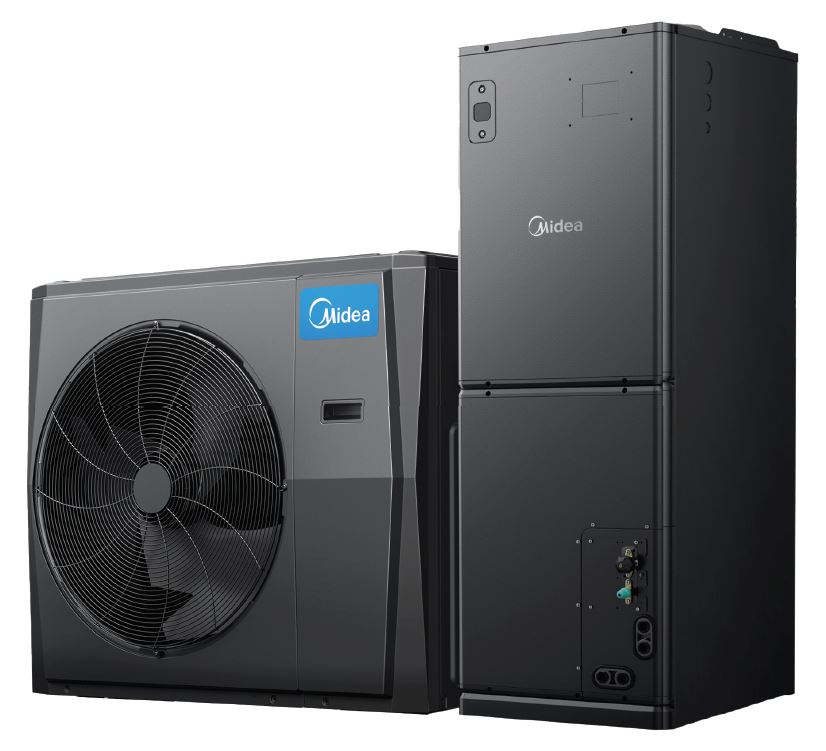For snow sports enthusiasts, the state of Maine offers a host of opportunities. And, with winter being Maine’s longest season, there’s plenty of time for thrill-seekers to enjoy those frigid temperatures.
But with these extended winters, which can arrive by Thanksgiving and continue to appear in May, it means a consistent and economical heating option is critical for residents.
While there have been many conversations (or arguments) about the practicality of heat pumps in cold climates, Mainers in recent years have fully embraced heat pump adoption. Given this transition is coming from a populace that was mostly reliant on oil for heat (around 80%), this renaissance is showing the rest of the country that heat pump adoption is possible in cold, northern states.

‘MAINE’ SOURCE OF HEAT: Residents of Maine have turned to heat pumps to replace old oil heaters, not only for their convenience and ease of install, but also for the energy savings and rebates. (Courtesy of Efficiency Maine)
The Uptick
The housing stock in Maine is old, and while maybe not reaching quite as far back as the first English settlement, which appeared in Maine in 1604, there are still a lot of leaky buildings.
With that in mind, the heat pump's ability to lend itself to retrofits has definitely been one of the many driving factors.
Peter Troast, from the Maine-based company Energy Circle, is also an ACCA consultant and a proponent of the Quality Installation program, which is focused on verifying HVAC equipment and system performance.
Troast said very few Maine homes have air conditioning, but the heat pump conversion is still an easy one.
“One-to-two ductless heads as an overlay to oil heat is an easy add-on — it doesn't require full system replacement, provides a/c, and takes load/cost away from oil in winter,” Troast said.
Maine is also home to a lot of rural residents, and given the state does get heavy snowfalls, trucking oil can become an issue — but that’s not a problem for those with heat pumps.
“The rural nature of the state (and pervasion of granite deposits) lends itself better to expensive trucked-in fuels (propane and oil), rather than piped (natural gas),” said Andy Meyer, senior program manager for Residential Programs, at Efficiency Maine.
Aside from the energy savings, which in part is driving this transition away from oil, the State of Maine itself is playing a huge role.
“Maine also offers a variety of state incentives and rebates that make installing energy-efficient heat pumps more financially accessible,” said David Rames, senior product manager at Midea. “These incentives, combined with more environmental awareness among the population and active promotion by local governments and utilities, as well as federal initiatives like the Inflation Reduction Act, are bolstering the adoption of heat pumps. These systems not only meet the heating and cooling needs efficiently but also align with broader environmental goals by reducing carbon emissions and dependency on fossil fuels.”
Efficiency Maine offers rebates up to $4,000, $6,000, or $8,000 per whole-home heat pump system depending on income level, in addition to federal tax credits of up to $2,600/year, Meyer added.
Additionally, the federal government offers tax credits up to $2,600, which include up to $2,000 for heat pump installations and additional amounts for electrical upgrades like 200+ amp circuit panels. This financial support substantially lowers the barrier to adopting these systems.
For the state’s hand in this, Maine passed a climate action plan in 2019, a.k.a. “Maine Won't Wait,” that aims to install 100,000 new heat pumps by 2025, with 15,000 new heat pumps being provided to income-eligible households.
“This goal will ensure that by 2030, 130,000 homes will be using 1-2 heat pumps (i.e., partial-home heat pump systems) and an additional 115,000 homes will be using whole-home heat pump systems,” the state’s website reads. “In 2023, Maine achieved its goal for the installation of 100,000 new heat pumps two years ahead of schedule. To continue Maine’s momentum, Governor Mills also unveiled a new target for the installation of another 175,m000 additional heat pumps in Maine by 2027. This new goal will bring the number of heat pumps installed in Maine homes, businesses, and public buildings during Governor Mills’ time in office to 275,000. If this target is achieved, Maine would have more than 320,000 heat pumps in total installed across the state.”

EDUCATION IS KEY: Midea recently donated a new EVOX central heat pump system along with a Midea All-Easy Pro ductless system to Central Maine Community College so that the students can practice with the latest technology on the equipment that they will use upon entering the workforce. (Courtesy of Midea)
The Brass Tacks
With families still battling with inflation in every other facet of life, a heat pump offers a way to scale down energy bills, which was another giant drawback for oil.
“Increasing energy costs have led to a shift towards more energy-efficient solutions, prompting homeowners to seek out heat pumps as a cost-effective way to reduce their heating bills,” Rames said. “It’s also in line with trends across the nation, as heat pump sales overtook sales of gas furnaces in the United States in 2022.”
Troast said the oil prices have fluctuated over the last few years — less than $2/gallon during COVID to almost $6 in mid-2022 — so the savings by taking load off oil and on to electricity has fluctuated, too.
And in some cases, those savings are significant.
“Until recently, most homes didn't have or need air conditioning, so as heat pumps are helping to cut some Mainers' heating costs in half, they offer the added (now desirable) benefit of a/c,” Meyer said. “Another factor that has contributed to the quick adoption of heat pumps is Mainers know their neighbors, and once one family discovered that heat pumps work in the cold, word spread quickly.”
These systems also feature room-by-room control, heat, a/c, and dehumidification without the temperature swings of combustion systems, making them more comfortable and economical to run.
“Many homeowners have seen a substantial decrease in their energy bills after switching to heat pumps, which use less energy compared to traditional HVAC systems like furnaces, translating into lower operating costs,” Rames said. “This efficiency, coupled with the ability to both heat and cool a home, allows for year-round comfort from a single system.”
But, like with any electrification effort, homeowners need to be aware they are going to see an increase on their electric bill. For contractors, it’s important to remind them that they are no longer paying for their old heating fuel source.
“I've heard that some homeowners are initially confused and alarmed by the increase in electric costs, sometimes not realizing the savings in oil,” Troast said. “This may in part be due to how each is paid for--electricity monthly, oil when the tank gets filled.”
How Contractors can Capitalize
The shift to electric heat sources is trending across the country, as heat pump sales overtook sales of gas furnaces in the United States two years ago. But there still is that lingering perception that heat pumps just don’t work in cold climates, which is prevalent among homeowners, and even contractors.
“Educating homeowners on the advancements in heat pump technology is vital to promoting their adoption across the country,” Rames said. “Contractors can play a critical role in addressing homeowners’ concerns by explaining the long-term benefits of reduced energy consumption and enhanced comfort. By demonstrating the capabilities of modern heat pumps, which are designed to operate efficiently in extreme cold conditions, homeowners will learn that systems like Midea’s EVOX G3 series can provide 100% heating output at -4°F and operate effectively down to -22°F.”

ADVANCED TECHNOLOGY: Unlike years past when they struggled to keep up in cold climates, new heat pumps, like Midea’s EVOX Xtreme Heat Series, are designed to perform exceptionally well even in extreme cold. (Courtesy of Midea)
There have been significant advancements in heat pump technology in regards to cold climate performance, so picking the right product is also key for not only producing results for the homeowner, but also for the reputation of heat pumps.
“While most heat pumps don't work well in the cold, there are plenty that do. Heat pumps work at temperatures below -20°F, so once contractors calculate the peak heating load of a house in the coldest hour of the year, they make sure the system they install is rated and designed to handle it,” Meyer said. “Dual fuel systems are rare because they are more expensive to install, maintain, and run. Heat pumps have evolved to a point where they don't need combustion for backup. This is recent.”
However, Rames said that when paired with traditional gas furnaces, this dual-fuel system option is gaining popularity as a versatile solution.
“These systems allow the heat pump to serve as the primary heating and cooling system, with the furnace kicking in only during extremely cold conditions when additional heating power is needed,” Rames said. “This setup offers an optimal balance of efficiency and comfort, ensuring homes remain warm even during the coldest days, while still benefiting from the energy efficiency of a heat pump for the majority of the year.”
But in a place like Maine where the heat pump has already proven itself due to its track record, Troast said these potential performance issues are no longer even talked about.
“From my perspective, cold climate performance isn't often questioned anymore,” Troast said. “Heat pumps have been successful over a number of winters and serious cold events, and the mainstream press has been very positive.”
Troast added that because most of Maine didn’t have a/c before heat pumps, and their rise has been almost entirely in the era of the newest technology, there aren't lingering narratives about performance that exist in other parts of the country.
Energy Circle
Lessons Learned
One lesson that contractors from other states can learn is the importance of comprehensive education and communication with homeowners about the benefits and capabilities of modern heat pumps.
“It’s crucial to debunk myths about heat pump inefficiency in cold weather by showcasing the latest advancements that ensure reliable performance, even in severe winter conditions,” Rames said.
To illustrate his point, Rames referenced a recent Midea survey, conducted with Atomik Research, that gauged homeowners’ and contractors’ awareness of heat pump technology and incentives for adoption.
“We found that 80% of homeowners claim to know what a heat pump is despite over half (54%) being unsure or unknowledgeable about its full capabilities, particularly its ability to provide both heating and cooling,” Rames said. “Furthermore, 87% of contractors and 82% of millennial homeowners say they would be more likely to consider switching to a heat pump in their own homes after learning more about the performance and cost-saving benefits of modern heat pumps. The results show that homeowners are eager to invest in heat pumps, and education regarding the technological advances will drive further adoption.”
Meyer said one big takeaway contractors can get from the phenomenal success seen in Maine is to think about changing the way they do business.
“Rather than relying on the traditional HVAC business model of waiting for the phone to ring, Maine's top heat pump installers do a very professional job promoting heat pumps,” Meyer said. “They use TV, radio, print, social media, digital advertising, referral bonuses, etc. They're taking a proactive approach with new and existing customers and not waiting for fossil fuel systems to age out or malfunction.”
Troast added that the leading volume heat pump contractors in that state, for the most part, are heat-pump-only companies, not necessarily full-service HVAC contractors, and while that business model has been quite successful, it may be unique to Maine's particular market conditions.
“The typical objections to heat pumps — particularly their viability for cold climates — can be erased when market penetration reaches a certain saturation, the tipping point,” Troast said. “At that point, customer acquisition costs decrease and are only held up by competition.”








